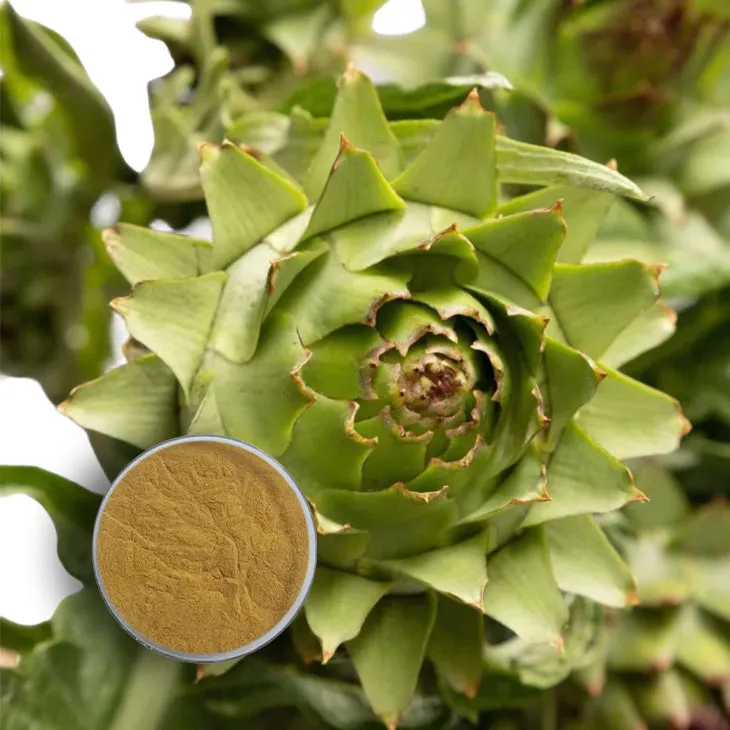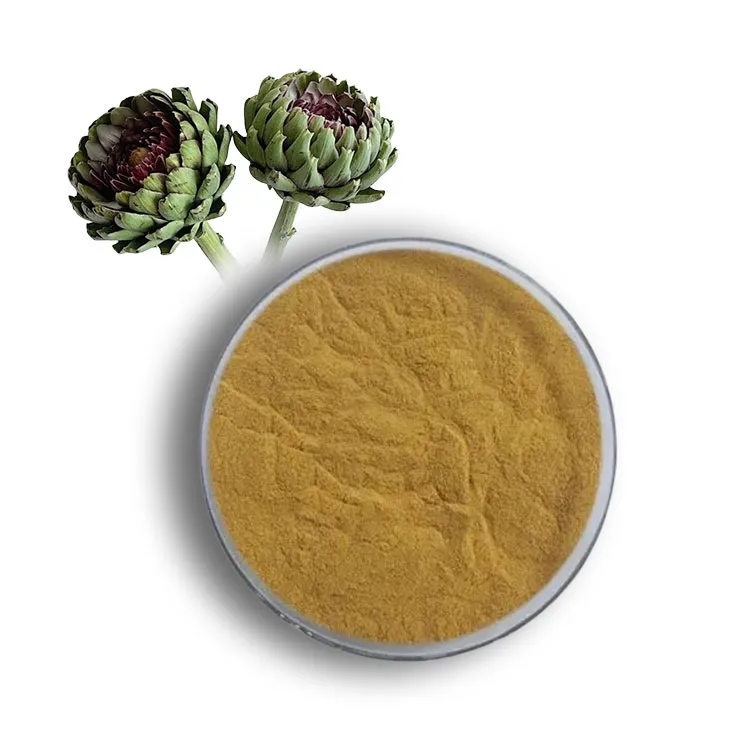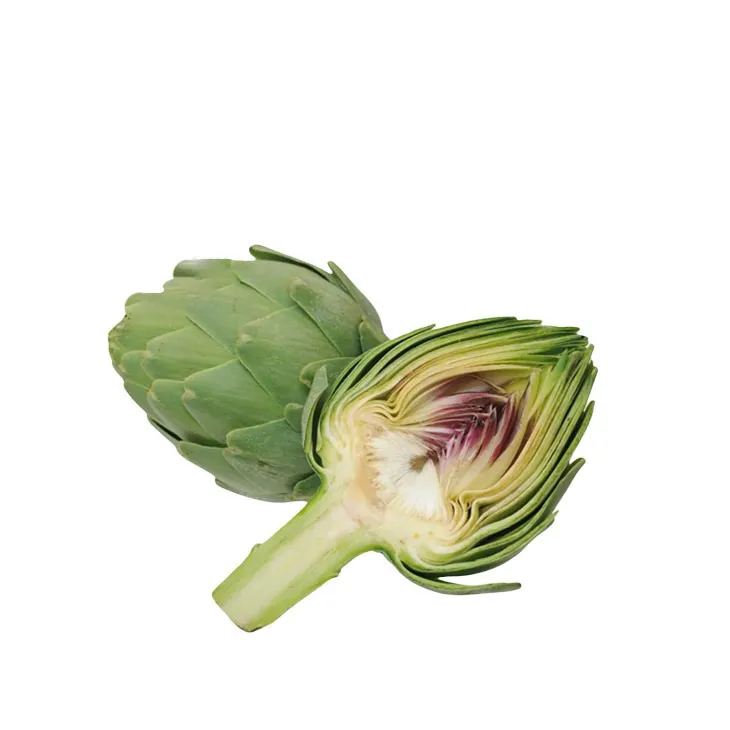- 0086-571-85302990
- sales@greenskybio.com
Unveiling the Compounds: A Deep Dive into Artichoke Leaf Extract's Chemical Composition
2024-07-04

Introduction
Artichoke (Cynara scolymus) has been recognized for its potential health benefits for centuries. The Artichoke Leaf Extract, in particular, has drawn significant attention in various fields, including medicine, nutrition, and cosmetics. This extract is a complex mixture of numerous compounds, each contributing to its unique properties. Understanding the chemical composition of Artichoke Leaf Extract is crucial for unlocking its full potential in different applications.

Major Classes of Compounds in Artichoke Leaf Extract
Phenolic Compounds
Phenolic compounds are one of the most prominent groups of substances in artichoke leaf extract. They play a vital role in determining the antioxidant and other beneficial properties of the extract.
- Cynarin: Cynarin is perhaps the most well - known phenolic compound in artichoke leaf extract. It has a distinct chemical structure with a caffeoylquinic acid moiety. Cynarin has been associated with several health - promoting effects. For example, it has been shown to have hepatoprotective properties, which means it can protect the liver from damage. Studies have demonstrated that cynarin can enhance liver function by increasing bile production and flow. This can help in the digestion and absorption of fats and fat - soluble vitamins. Moreover, cynarin has antioxidant activity, which helps in neutralizing free radicals in the body. Free radicals are unstable molecules that can cause oxidative stress and damage to cells, leading to various diseases such as cancer, heart disease, and neurodegenerative disorders.
- Luteolin: Another important phenolic compound in artichoke leaf extract is luteolin. Luteolin is a flavonoid with antioxidant, anti - inflammatory, and anti - carcinogenic properties. Research has indicated that luteolin can inhibit the growth of cancer cells by interfering with various cellular signaling pathways. It also has anti - inflammatory effects, which can be beneficial in conditions such as arthritis and other inflammatory diseases. In addition, luteolin may contribute to the cardiovascular health benefits of artichoke leaf extract. It can help in reducing blood pressure, improving blood lipid profiles, and preventing platelet aggregation.
Terpenoids
Terpenoids are another significant class of compounds present in artichoke leaf extract.
- Some terpenoids in artichoke leaf extract have been shown to possess anti - microbial properties. They can inhibit the growth of various bacteria, fungi, and viruses. For instance, certain terpenoids may be effective against common food - borne pathogens, making artichoke leaf extract a potential natural preservative in the food industry.
- Terpenoids also contribute to the flavor and aroma of artichoke. The unique taste and smell of artichoke are partly due to the presence of these terpenoids. In the cosmetics industry, the terpenoids in artichoke leaf extract can be used for their fragrance - providing properties.
Other Compounds
Artichoke leaf extract also contains other compounds that contribute to its overall properties.
- There are polysaccharides present in the extract. These polysaccharides may have immunomodulatory effects, meaning they can regulate the immune system. Studies suggest that they can enhance the activity of immune cells such as macrophages and lymphocytes.
- Inorganic compounds such as potassium, magnesium, and calcium are also found in artichoke leaf extract. These minerals play important roles in various physiological processes in the body. For example, potassium is essential for maintaining proper heart function and fluid balance.

How the Compounds Contribute to Health Benefits
The compounds in artichoke leaf extract work synergistically to confer various health benefits.
- Digestive Health: The combination of cynarin and other phenolic compounds helps in improving digestion. By increasing bile production, as mentioned earlier, it aids in the breakdown and absorption of fats. This can be beneficial for people with digestive disorders such as indigestion, bloating, and constipation. Artichoke leaf extract has also been used traditionally to relieve symptoms of irritable bowel syndrome (IBS).
- Cardiovascular Health: Luteolin and other compounds contribute to cardiovascular health. As described before, luteolin can help in reducing blood pressure and improving blood lipid profiles. The antioxidant properties of the phenolic compounds also protect the heart and blood vessels from oxidative damage. Studies have shown that regular consumption of artichoke leaf extract may reduce the risk of heart disease.
- Antioxidant Defense: The phenolic compounds, especially cynarin and luteolin, along with the antioxidant properties of some terpenoids, provide a powerful antioxidant defense in the body. They scavenge free radicals, reducing oxidative stress. This antioxidant activity is associated with a reduced risk of chronic diseases and may also have anti - aging effects.
- Anti - Inflammatory Effects: Luteolin and other anti - inflammatory compounds in the artichoke leaf extract help in reducing inflammation in the body. Chronic inflammation is associated with many diseases, including arthritis, diabetes, and certain cancers. By reducing inflammation, artichoke leaf extract may play a role in the prevention and treatment of these diseases.

Applications of Artichoke Leaf Extract Based on its Chemical Composition
Medical Applications
Artichoke leaf extract has potential applications in medicine.
- Due to its hepatoprotective properties, it can be used in the treatment of liver diseases. It may be beneficial in cases of hepatitis, fatty liver disease, and liver cirrhosis.
- For its anti - inflammatory and antioxidant properties, it may be used in the management of arthritis and other inflammatory joint diseases. Artichoke leaf extract can potentially reduce pain, swelling, and stiffness in the joints.
- Its potential anti - carcinogenic properties make it a candidate for further research in cancer prevention and treatment. Although more studies are needed, the presence of compounds like luteolin gives hope for its use in cancer therapy.
Nutritional Applications
Artichoke leaf extract can also be used in the field of nutrition.
- It can be added to dietary supplements. Given its various health benefits, it can be a valuable addition to supplements aimed at improving digestive health, cardiovascular health, or antioxidant status. For example, it can be combined with other herbal extracts to create a comprehensive health - promoting supplement.
- Artichoke - based products can be developed as functional foods. These could be foods that not only provide basic nutrition but also offer additional health benefits. For instance, artichoke - flavored beverages or artichoke - enriched snacks could be created.
Cosmetic Applications
The chemical composition of artichoke leaf extract also lends itself to cosmetic applications.
- The antioxidant and anti - inflammatory properties make it suitable for use in skin care products. It can be used in creams, lotions, and serums to protect the skin from environmental damage and reduce inflammation. Artichoke leaf extract may help in reducing skin redness, wrinkles, and other signs of aging.
- The terpenoids in the extract can be used for their fragrance - providing properties in perfumes and other scented products. This gives a natural and unique aroma to the cosmetics.
Conclusion
Artichoke leaf extract is a rich source of various compounds, including phenolic compounds, terpenoids, polysaccharides, and inorganic compounds. These compounds interact to provide a wide range of potential health benefits and diverse applications. Further research is still needed to fully understand the mechanisms of action of these compounds and to explore new applications. However, the current knowledge about the chemical composition of artichoke leaf extract already offers great potential for its use in medicine, nutrition, and cosmetics.
FAQ:
What are the main phenolic compounds in artichoke leaf extract?
The main phenolic compound in artichoke leaf extract is cynarin. However, there are also other phenolic compounds present, such as chlorogenic acid and luteolin - 7 - glucoside. These phenolic compounds contribute to the antioxidant and other beneficial properties of the extract.
How do the compounds in artichoke leaf extract contribute to its health benefits?
The phenolic compounds like cynarin in artichoke leaf extract have antioxidant properties. Antioxidants can neutralize free radicals in the body, reducing oxidative stress. This may help in preventing various diseases such as heart disease and certain cancers. Also, some compounds may have anti - inflammatory effects, which can be beneficial for conditions like arthritis.
What are the diverse applications of artichoke leaf extract?
Artichoke leaf extract has diverse applications. In the field of medicine, it may be used as a dietary supplement for liver health, as it may help in improving liver function. In the food industry, it can be used as a natural flavor enhancer due to its unique taste. Additionally, in the cosmetic industry, it may be incorporated into products for its antioxidant properties, which can help in skin health.
How is the chemical composition of artichoke leaf extract determined?
The chemical composition of artichoke leaf extract is determined through various analytical techniques. High - performance liquid chromatography (HPLC) is commonly used to separate and identify the different compounds present in the extract. Spectroscopic methods such as UV - Vis spectroscopy can also be used to study the chemical properties of the compounds. Mass spectrometry can be employed to determine the molecular weight and structure of the compounds in the extract.
Are there any potential side effects related to the compounds in artichoke leaf extract?
While artichoke leaf extract is generally considered safe for most people, some individuals may experience side effects. For example, some people may have an allergic reaction to the compounds in the extract. Also, in large doses, it may cause gastrointestinal problems such as bloating, flatulence, or diarrhea. However, these side effects are relatively rare.
Related literature
- Chemical Composition and Bioactivity of Artichoke (Cynara scolymus L.)"
- "The Role of Artichoke Leaf Extract in Liver Health: A Review of Its Chemical Constituents and Mechanisms"
- "Phenolic Compounds in Artichoke: From Chemical Structure to Health - Promoting Properties"
- ▶ Hesperidin
- ▶ citrus bioflavonoids
- ▶ plant extract
- ▶ lycopene
- ▶ Diosmin
- ▶ Grape seed extract
- ▶ Sea buckthorn Juice Powder
- ▶ Beetroot powder
- ▶ Hops Extract
- ▶ Artichoke Extract
- ▶ Reishi mushroom extract
- ▶ Astaxanthin
- ▶ Green Tea Extract
- ▶ Curcumin Extract
- ▶ Horse Chestnut Extract
- ▶ Other Problems
- ▶ Boswellia Serrata Extract
- ▶ Resveratrol Extract
- ▶ Marigold Extract
- ▶ Grape Leaf Extract
- ▶ blog3
- ▶ Aminolevulinic acid
- ▶ Cranberry Extract
- ▶ Red Yeast Rice
- ▶ Red Wine Extract
-
Konjac Powder
2024-07-04
-
Giant Knotweed Extract
2024-07-04
-
Aminolevulinic acid
2024-07-04
-
Coix Seed Extract
2024-07-04
-
Sugarcane Extract
2024-07-04
-
Curcumin
2024-07-04
-
melatonin extract
2024-07-04
-
Cocoa Extract
2024-07-04
-
Camu Camu Extract
2024-07-04
-
Grape Seed Extract
2024-07-04





















